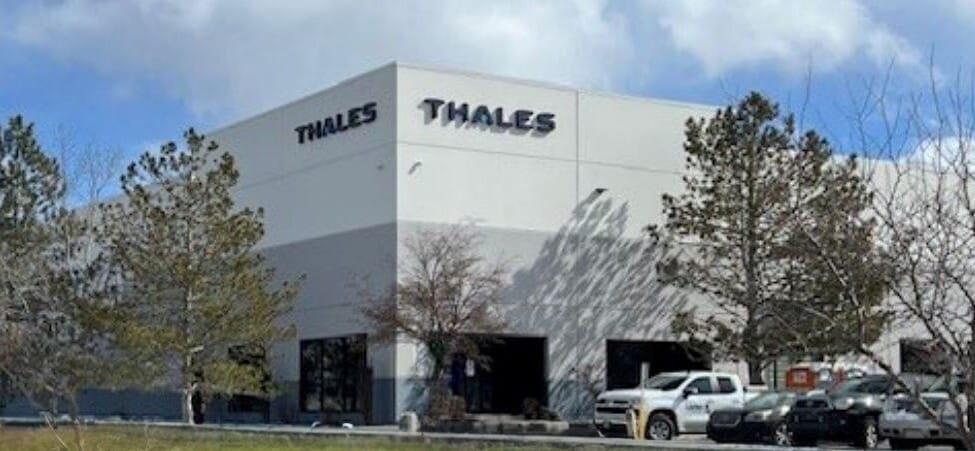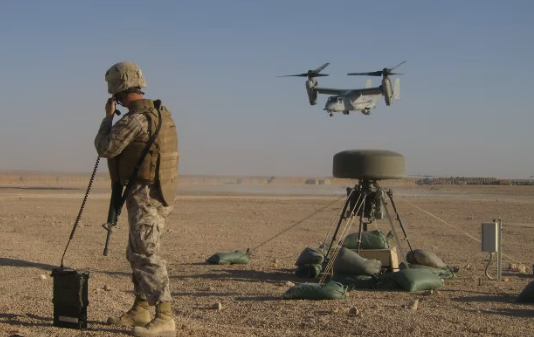

Thales, a large global multinational enterprise that designs, develops and manufactures electrical systems for aerospace, defense, security, and transportation, recently held a ribbon-cutting event for its first facility in Utah. Thales operates in 68 countries and is headquartered at La Défense, a business district in Paris known for its postmodern architecture. Thales (pronounced "Tallis") employs over 85,000 people, including 5,000 in North America. Its Salt Lake City site employs about 50 people, mostly technicians and engineers. The Salt Lake City team works in concert with a similar team in Italy to design and manufacture navigation systems for military aircraft.
For over 80 years, Thales, and its acquired companies, have been providing ATM (Air Traffic Management) programs for customers, including the U.S. Department of Defense (DOD), the Federal Aviation Administration (FAA), NAV CANADA, and the Canada Department of National Defense (DND). Globally, Thales systems account for more than 75% of all navigation aids. 99% of U.S. commercial airports rely on Thales navigation aids, such as their instrument landing systems, to assist pilots in landing safely, day or night, and under adverse weather conditions.
The recent ribbon-cutting of Thales' design and manufacturing plant comes as a result of Thales' October 2021 acquisition of Moog Navigation Aids Systems based in West Salt Lake City, providing the site for Thales' new Utah presence. At this facility for decades Moog has been designing and manufacturing advanced aerospace navigation aids for the U.S. military and commercial customers worldwide, including its speciality—compact, low-maintenance "man-portable" navigation systems for military applications.
Moog, and the Utah-based company it originally acquired, Montek, have a complicated ownership backstory. Based in New York, Moog acquired Salt Lake City-based Montek Co, for $160 million in October 1998. Montek, an aviation technology pioneer, was founded in Salt Lake City in 1955. In 1995, Montek became a Raytheon company when Raytheon acquired E-systems Inc., Montek's parent. Montek manufactured flight controls and navigation technology that became a staple for commercial airports for decades.

Todd Donovan, Thales' VP over Digital Aviation and Air Traffic Management in the Americas, sat down with TechBuzz at the ribbon-cutting event to explain the significance of the navigation technology that is being produced at the Salt Lake City site:
"Historically, navigation systems give pilots location information relative to where they want to go. In the military it is known as Tactical Air Navigation (TACAN), a navigation system that provides military aircraft with bearing and distance information to a ground, ship, or man-portable sensor. So if you're piloting a helicopter and you're trying to return back to land on a landing pad on the ground or on a ship, this is the signal that tells you what direction that you need to go back home."

Thales broader portfolio also includes other aerospace products such as instrument landing systems for commercial aircraft that are used at virtually all commercial airports, all provided by Thales for the past five decades.
Donovan explained further, "You see those antennas at the end of an airport runway? They are giving the pilot a signal indicating the plane is either on the centerline of the runway, right or left, or too high or too low. It is critical information for all pilots, and almost every commercial airport in the world has at least one of these landing systems, even though most aircraft today increasingly navigate with satellite based navigation such as GPS. This instrument landing system is now a backup system for airports. It's very precise. And it works in low visibility situations such as in bad storms."
Donovan shared his thoughts about the acquisition and working with state and local government. "We bought the company (Moog) because we liked the product lines, the prospects, the business, the local vendors, and the people who work there. It is now a Thales location. As we have integrated this facility into our broader operations, we feel it has been a very nice experience for us. There's a great sense of community here, and the people have been great to work with. It's a very family oriented environment. Working with the city and state government in getting permits etc. has been fantastic. They have come through on their promises."
Thales participated in Utah's corporate incentive program known as the Economic Development Tax Increment Financing (EDTIF) program. As part of its agreement with the state of Utah, Thales projects to add 54 new, high-paying jobs. It plans to invest $21,000,000 in Utah during the next 10 years, an endeavor that will include moving to a new, larger facility.
Donovan suggested that Thales' Salt Lake City presence could play a role as a catalyst for the company's future expansion into advanced unmanned air mobility solutions, including drones, and air taxis.

